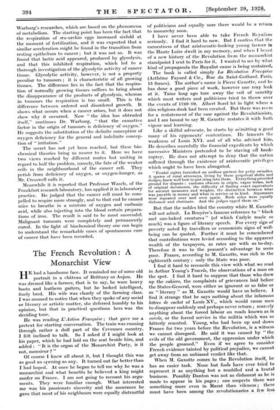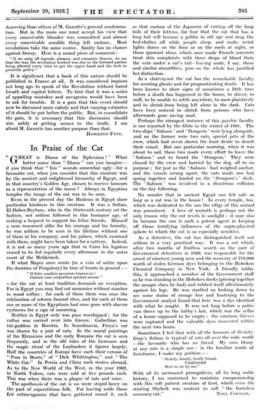The French Revolution : A Monarchist View
HE had a handsome face. It reminded me of some old portrait in a château of Brittany or Anjou. He was dressed like a farmer, that is to say, he wore heavy boots and leathern gaiters, but he looked intelligent, finely bred. His wife was clearly of the farming class. I was amused to notice that when they spoke of any social or literary or artistic matter, she deferred humbly to his opinion, but that in practical questions hers was the deciding tone.
He was reading L'Action Francaise ; that gave me a pretext for starting conversation. The train was running through rather a dull part of the Cevennes country. I felt inclined to talk. So I asked if I might look at his paper, which he had laid on the seat beside him, and added : " It is the organ of the Monarchist Party, is it not, monsieur ? "
Of course I knew all about it, but I thought this was as good an evening as any. It turned out far better than I had hoped. At once he began to tell me why he was a monarchist and what benefits he believed a king might confer on France. I am not going to recount his argu- ments. They were familiar enough. What interested me was his passionate sincerity and the assurance he gave that most of his neighbours were equally distrustful of politicians and equally sure there would be a return to monarchy soon.
I have never been able to take French Royalism seriously. I find it hard to now. But I confess that the earnestness of that aristocratic-looking young fanner in the Haute Loire dwelt in my memory, and when I heard of a new history of the Revolution from the monarchist standpoint I sent to Paris for it. I wanted to see by what kind of propaganda the Royalist cause is being sustained.
The book is called simply La. Revolution Fraxfaise (Artheme Fayard & Cie., Rue du Saint-Gothard, Paris, 15 francs). The author's name is Pierre Gaxotte, and he has done a good piece of work, kowever one may look at it. Taine long ago tore away the veil of sanctity which most writers and politicians tried to throw over the events of 1789-99. Albert Sorel let in light where a dim religious dusk had been created. But there was teem for a restatement. of the case against the Revoldtianists, and I am bound to say M. Gaxotte restates it with both vigour and learning.
Like a skilful advocate, he starts by admitting a 'good many of his opponents' contentions. He laments the weakness of Louis XVI. and of all who advised him. He describes scornfully the financial expedients by which successive Ministers pretended to be staving off bank- ruptcy. He does not attempt to deny that the nation suffered through the existence of aristocratic privileges which ought to have been abrogated.
" Feudal rights furnished an endless pretext for petty swindles. A spawn of rural attorneys, living by these perpetual shifts and dodges, knew well how to put sting into them. Everything provided ground for dispute : customs obscure in origin, vague terms, lack of original documents, the difficulty of finding exact equivalents for ancient measures and weights, the distinctien between what was payable in money and what in service or in kind. Arguments were repeated over and over again. Both sides were equally dishonest and obstinate. And the judges egged them on."
But that the nobles bled the country white M. Gaxotte will not admit. La Bruyere's famous reference to " black and sun-baked creatures " (of which Carlyle made so much) was a figure of literary speech. For every sign of poverty noted by travellers or economists signs of well- being can be quoted. Further it must be remembered that contributions were levied according to the apparent wealth of the taxpayers, as rates are with us to-day. Therefore it was to the peasant's advantage to seem poor. France, according to M. Gaxotte, was rich in the eighteenth century ; only the State was poor.
I find it hard to reconcile thii view with what we read in Arthur Young's Travels, the observations of a man on the spot. I find it hard to suppose that those who drew up the cahiers, the complaints of grievances laid before the States-General, were either so ignorant or so false or so " literary " as M. Gaxotte would have us believe. I find it strange that he says nothing about the infamous lettres de cachet of Louis XV., which would cause men to disappear suddenly and perhaps never return ; scarcely anything about the forced labOur on roads known as la eon* or the forced service in the militia which was so bitterly resented. Young, who had been up_ and down France for two years before the Revolution, is a witness we cannot disregard. He said it was caused by " the evils of the old government, the oppression under which the people groaned." Even if we agree to consider French evidence tainted by political prejudice, we cannot get away from an unbiased verdict like that.
When M. Gaxotte comes to the Revolution itself, he has an easier task. None but fools have ever tried to represent it as anything but a muddled and a brutal business. Possibly Danton was not as dishonest as he is made to appear in his pages ; one suspects there was something more even in Marat than vileness ; there must have been among the revolutionaries a few less. deserving than others of M. Gaxotte's general condemna- tion. But in the main one must accept his view that every conceivable blunder was committed and almost every conceivable sensible thing left undone. Most revolutions take the same course. Sanity has no chance against frenzy. Here is a sound piece of comment : " If we strip off legends, phrases, and romantic illusion, we see that the way the revolution worked was due to the forward parties being allowed every time to get the upper hand and the mob to prescribe policy."
It is significant that a book of this nature should be published in France at all. It was considered impious not long ago to speak of the Revolution without bated breath and capital letters. To hint that it was a series of appalling mistakes and savageries would have been to ask for trouble. It is a gain that this event should now be discussed more calmly and that varying estimates of it should be put before the public. But, to consolidate the gain, it is necessary that this discussion should aim solely at getting nearer to the truth. I am afraid M. Gaxotte has another purpose than that.
HAMILTON FYFE.





































 Previous page
Previous page